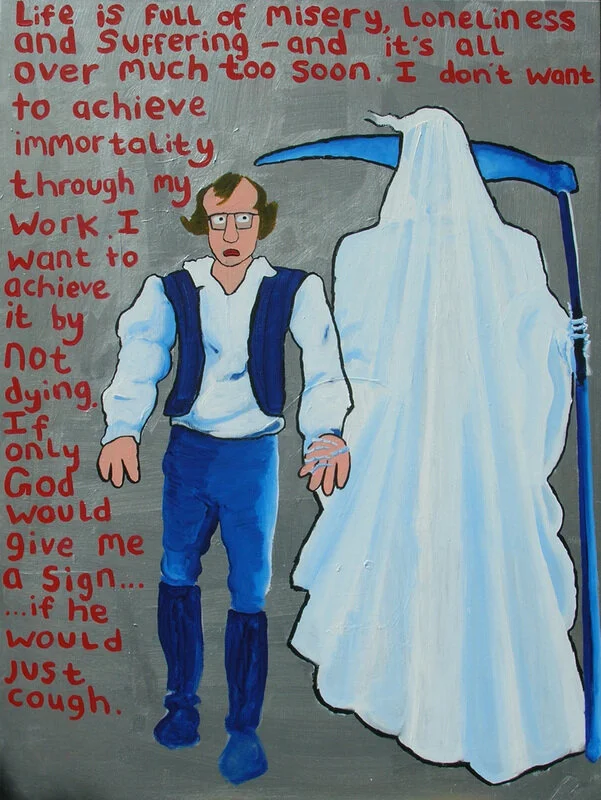Groucho Marx
Julius "Groucho" Marx was born in 1890, the third of five boys born to Minnie Schoenberg and Sam “Frenchie” Marx. As a child Groucho’s dream was to study and eventually become a doctor. Because his family were so poor, he had to abandon his dreams and leave school at 12 to find work. Minnie believed that there was no other business in the world where people could succeed without education except show business, so she pushed her sons into being entertainers. Initially Groucho and his brothers thought their best bet was to become singers so they toured under the name, The Nightingales. Realising that Groucho’s in between song banter and ad libs got a bigger response than the songs, the brothers decided to ditch the singing. When they tried dabbling their hand at comedy, their first idea was that each brother would pretend to be of a different ethnicity. Harpo pretended to be Irish, Gummo pretended to be an Italian man and Groucho pretended to be German. They then tried performing a sketch in which most of the brothers pretended to be anarchic school kids and Groucho played the part of a mad headmaster. By 1910 The Marx Brothers were popular comedians who began enjoying hit stage shows. Eventually their Broadway hits Coconuts and Animal Crackers would become hit Hollywood films.
In the documentary, The One And Only Groucho, clips of Groucho as dictator Rufus T. Firefly singing, “Whatever it is, I’m Against It” (from the 1933 film Duck Soup) are inter-cut with comments from Groucho’s friends and fans. They say that they loved him because he wasn’t afraid of being disliked and would knock anything and everybody. They say they also loved his way with words, his acid tongue, his perfect comic timing, his clownish antics, his sense of rhythm, his use of surrealism and the fact he was a naughty Jewish boy. As his fame grew, Groucho was asked to explain the secret of his success and he quipped, “The secret of success is fair dealing and honesty, if you can fake those you’ve got it made.”
Groucho was the inspiration for the cartoon Bugs Bunny. Directors such as Federico Fellini begged him to be in their films. But not everybody was a fan, Benito Mussolini felt it necessary to ban Duck Soup.
Although Groucho once remarked, “I must say I find television very educational. The minute someone turns it on, I go to the library and read a good book.” In his later years Groucho hosted an Emmy Award winning TV show called, You Bet Your Life which ran for a decade.
Groucho married several times, always to women considerably younger than himself. One of his famous quips was, “A man is only as old as the woman he feels.” Sometime in the 70s, Groucho needed help answering fan mail and so hired a young lady called Erin Fleming to be his secretary. Fleming, who was keen to be an actress, went from being Groucho’s assistant to being his constant companion to being his manager. She loved being seen out with Groucho and persuaded him to go on hip chat shows and hang out with young celebrities. To her delight Groucho became mates with music stars such as Elton John, Freddie Mercury and Alice Cooper. Groucho had a son with his first wife who was unsure of Fleming’s motives. Eventually it was revealed Erin had a problem with class A drugs and had mental health issues. Erin bullied the elderly Groucho. She would shout at him till he cried and sometimes beat him up. Groucho died of pneumonia a few days after Elvis Presley in 1977. Fleming lost several court cases against the Marx family, had to pay back Groucho’s money and eventually took her own life.
The influence of Groucho & Co can be seen in the Dick Lester film, A Hard Day’s Night, The Zucker Brother movies such as Airplane! The Mel Brooks masterpiece, Young Frankenstein and Woody Allen's earlier funny films such as, Love and Death. There are also many TV shows of the past that feature a main character that has a bit of Groucho in him such as; The Adams Family, Sgt Bilko, M.A.S.H, and Rising Damp. Although, in more recent times, cartoon versions of Groucho have made a cameo in shows like; The Simpsons, and Family Guy, I imagine his popularity is finally dwindling. It's difficult to think of a comedian currently doing the rounds who is even vaguely like him. And, in 2018 when The BFI had a Marx Brothers season, I doubt there were any teenagers in the audience.
Some years back the Marxist philosopher and cultural critic Slavoj Zizek claimed he found the best way of explaining Freud’s idea of the ID, the Ego and The Super Ego was to show his students video clips of Groucho, Chico and Harpo. I imagine he baffled the hell out of them. Maybe in years to come Marx Brothers films wont even be thought of as comedies? What would Groucho’s take on this situation be I wonder? Maybe something like: “Why should I care about posterity? What's posterity ever done for me?”
Groucho and Harpo by Harry Pye and Geraldine Swayne
Text © Harry Pye, 2020





